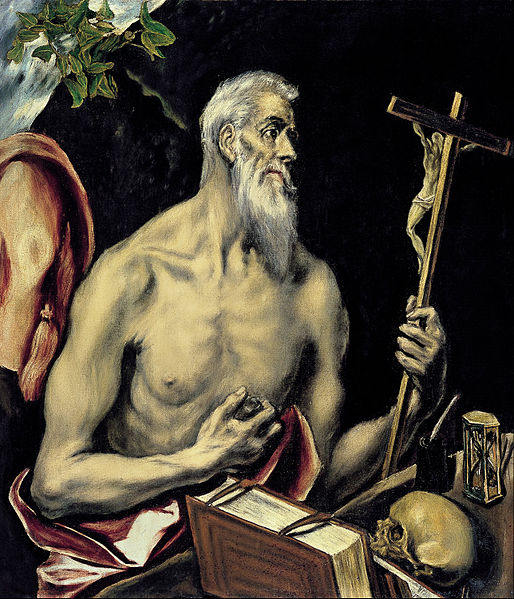 |
| El Greco: St. Jerome in the Desert. Wikimedia Commons |
Today is the memorial of St. Jerome, Doctor of the Church.
The second reading in the Office of Readings today reveals this saint's great love for Sacred Scripture. You can't read this and not find yourself making half-formed resolutions to read the bible more often, or in a more in-depth way than you are already doing.
My upcoming book includes an essay titled "You're Canonizing Him?" It discusses the controversies over some recent beatifications and canonizations. Various members of the chattering class--both liberal and conservative--voiced objections when several 20th century popes were accorded these honors. Believe it or not, even Mother Teresa was seen as an imperfect role model by some of these commentators.
The difficulty is that in our modern age, journalism plus hi-tech communication brings us every smile, frown, step and mis-step, success and failure of prominent people. We don't have this kind of data on the saints of old, so we tend to imagine that they were perfect. We probably have to remind ourselves that they didn't walk around day and night. with their eyes cast always heavenward, carrying a lily in one hand and a crucifix in the other.
But of course these saints had their flaws. And I don't refer to pre-conversion lives of sin, left behind forever after grace captured their souls (e.g. St. Augustine). I refer to faults they struggled with while living the holy lives that we admire.
If St. Jerome were up for canonization today, the usual suspects would be having the vapors, passing the smelling salts, and in between swoons of horror would be burning up Facebook and Twitter to make sure we knew what a temperamental, often nasty man Jerome could be. His statements of apparent professional jealousy towards Sts. Ambrose and Augustine would be repeated on endless loop. (Leaving out in their tirades, Jerome's deep awareness of his faults as evidenced by a life of penance that the chatterers would similarly not understand.)
All missing the point, of course, that all of us are sinners, even saints. But the saints are the ones who show us how to repent, and whose joy in forgiveness of their very real faults spurs them to great deeds.